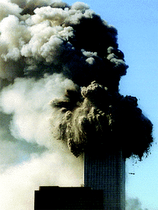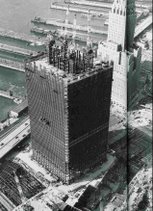The Washington Post article below, entitled "Colonel: Pentagon playing politics with Gitmo trials," suggests I may be right. In the article, the former lead prosecutor for terrorism trials at Guantánamo Bay says that senior defense officials discussed in a September 2006 meeting the "strategic political value" of putting some prominent detainees on trial. This is not "playing politics" as stated in the title of the article. When the Pentagon talks about "strategic political value" (and much of what it does addressed to the public), it is engaged in information warfare.
"[T]he public information battle space is simply too important to ignore."
http://www.nieman.harvard.edu/reports/01-4NRwinter/16-19.pdf
(at page 3 of 4, quoting Major Gary Pounder, the chief of intelligence plans and presentations at the College of Aerospace Doctrine, Research and Education at Maxwell Airforce Base in an article in Aerospace Power Journal. Notice that Major Pounder explicitly says that Public Affairs specialists need to be involved in Information Operations to "win the media war.")
Of course, Psychological Operations (a subset of Information Operations/Wafare) are only used against foreign audiences:
http://www.fiu.edu/~apodaca/Information%20Warfare%20Lecture.ppt
(page 10 of 37)

I guess that makes the U.S. public a foreign audience.
Here's the article and some excerpts:
http://archives.seattletimes.nwsource.com/cgi-bin/texis.cgi/web/vortex/display?slug=gitmo21&date=20071021&query=%22strategic+political+value%22
Colonel: Pentagon playing politics with Gitmo trials
By Josh White
The Washington Post
WASHINGTON — Politically motivated officials at the Pentagon have pushed for convictions of high-profile detainees ahead of the 2008 elections, the former lead prosecutor for terrorism trials at Guantánamo Bay said Friday night, adding that the pressure played a part in his decision to resign earlier this month.
Senior defense officials discussed in a September 2006 meeting the "strategic political value" of putting some prominent detainees on trial, said Air Force Col. Morris Davis. He said that he felt pressure to pursue cases that were deemed "sexy" over those that prosecutors believed were the most solid or were ready to go.
Davis said his resignation also was prompted by newly appointed senior officials seeking to use classified evidence in what would be closed sessions of court, and by almost all elements of the military commissions process being put under the Defense Department general counsel's command, something he believes could present serious conflicts of interest.
"There was a big concern that the election of 2008 is coming up," Davis said. "People wanted to get the cases going. There was a rush to get high-interest cases into court at the expense of openness."
. . .
Part of the new focus, Davis said, was to speed up cases that would show the public the system was working. Davis said he wanted to focus on cases that had declassified evidence, so the public could see the entire trial through news coverage. That would defuse possible allegations that the trials were stacked against defendants.
But [Air Force Brig. Gen. Thomas Hartmann, a new legal adviser to the convening authority for military commissions] said he was satisfied with putting on cases that included closed sessions, because the law allows it.
"He said, the way we were going to validate the system was by getting convictions and good sentences," Davis said. "I felt I was being pressured to do something less than full, fair and open."
Given the widespread public distrust of the 9/11 official story, it would appear urgent to "validate the system," in a controllable forum.









No comments:
Post a Comment